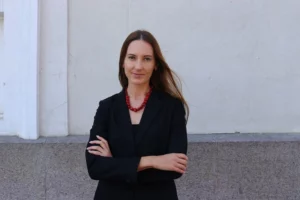


“THE EFFECT OF SERVICE ROBOT ANTHROPOMORPHISM AND UNCANNINESS ON CONSUMER RISK PERCEPTIONS AND RISK BEHAVIOR IN BANKING: EFFECTS AND INDIVIDUAL DIFFERENCES”
Date: 10 a.m. on the 7th of June 2023
Location: ISM University of Management and Economics, room 206. Gediminas av. 7, Vilnius, Lithuania.
Supervisors:
Prof. dr. Yannick Joye (ISM University of Management and Economics / Vilnius University, Social Sciences, Management – S 003). (2020-2023)
Prof. dr. Indre Pikturnienė (ISM University of Management and Economics, Social Sciences, Management – S 003). (2019-2021)
Prof. dr. Justina Gineikienė (ISM University of Management and Economics / Vilnius University, Social Sciences, Management – S 003). (2017-2019)
About Doctoral Dissertation:
Humanlike service robots are becoming increasingly common in various industries, however, outcomes and boundary conditions of their application in customer-facing functions still require more attention. This dissertation aims to address this gap by investigating whether service robot anthropomorphism affects four dimensions of consumer risk perception and risk behavior in the form of an investment task in a bank service setting. It moreover delves into the question whether uncanniness mediates this effect and to what extent individual differences affect this relationship. To answer the research questions, three experimental online studies were conducted featuring robots of various degrees of humanlikeness. The findings demonstrate that medium service robot anthropomorphism elicits the most favorable consumer risk perception, which is mediated by uncanniness. Risk behavior remains unaffected. Technology readiness and behavioural inhibition moderate these effects suggesting avenues for psychometric targeting and tailored roll-outs of humanlike service robots to specific audiences. This dissertation moreover proposes a theoretical model to explain the uncanny valley phenomeon. Overall, this work extends research on anthropomorphism service robots in the domain of consumer behavior. It provides new theoretical insights regarding moderators and relevant consumer outcomes and offers practical recommendations for businesses.
Defense board members
Chairperson:
Prof. dr. Viltė Auruškevičienė (ISM University of Management and Economics, Social Sciences, Management, S 003)
Members:
Prof. dr. Bernadeta Goštautaitė (ISM University of Management and Economics, Social Sciences, Management, S 003);
Prof. dr. Rutger van Oest (BI Norwegian Business School, Social Sciences, Management, S 003);
Prof. dr. Vida Škudienė (ISM University of Management and Economics, Social Sciences, Management, S 003);
Prof. dr.Sigitas Urbonavičius (Vilnius University, Social Sciences, Management, S 003).
The dissertation is available at the Martynas Mažvydas National library and the Library of ISM University of Management and Economics.
“THE EFFECT OF SERVICE ROBOT ANTHROPOMORPHISM AND UNCANNINESS ON CONSUMER RISK PERCEPTIONS AND RISK BEHAVIOR IN BANKING: EFFECTS AND INDIVIDUAL DIFFERENCES”
Date: 10 a.m. on the 7th of June 2023
Location: ISM University of Management and Economics, room 206. Gediminas av. 7, Vilnius, Lithuania.
Supervisors:
Prof. dr. Yannick Joye (ISM University of Management and Economics / Vilnius University, Social Sciences, Management – S 003). (2020-2023)
Prof. dr. Indre Pikturnienė (ISM University of Management and Economics, Social Sciences, Management – S 003). (2019-2021)
Prof. dr. Justina Gineikienė (ISM University of Management and Economics / Vilnius University, Social Sciences, Management – S 003). (2017-2019)
About Doctoral Dissertation:
Humanlike service robots are becoming increasingly common in various industries, however, outcomes and boundary conditions of their application in customer-facing functions still require more attention. This dissertation aims to address this gap by investigating whether service robot anthropomorphism affects four dimensions of consumer risk perception and risk behavior in the form of an investment task in a bank service setting. It moreover delves into the question whether uncanniness mediates this effect and to what extent individual differences affect this relationship. To answer the research questions, three experimental online studies were conducted featuring robots of various degrees of humanlikeness. The findings demonstrate that medium service robot anthropomorphism elicits the most favorable consumer risk perception, which is mediated by uncanniness. Risk behavior remains unaffected. Technology readiness and behavioural inhibition moderate these effects suggesting avenues for psychometric targeting and tailored roll-outs of humanlike service robots to specific audiences. This dissertation moreover proposes a theoretical model to explain the uncanny valley phenomeon. Overall, this work extends research on anthropomorphism service robots in the domain of consumer behavior. It provides new theoretical insights regarding moderators and relevant consumer outcomes and offers practical recommendations for businesses.
Defense board members
Chairperson:
Prof. dr. Viltė Auruškevičienė (ISM University of Management and Economics, Social Sciences, Management, S 003)
Members:
Prof. dr. Bernadeta Goštautaitė (ISM University of Management and Economics, Social Sciences, Management, S 003);
Prof. dr. Rutger van Oest (BI Norwegian Business School, Social Sciences, Management, S 003);
Prof. dr. Vida Škudienė (ISM University of Management and Economics, Social Sciences, Management, S 003);
Prof. dr.Sigitas Urbonavičius (Vilnius University, Social Sciences, Management, S 003).
The dissertation is available at the Martynas Mažvydas National library and the Library of ISM University of Management and Economics.